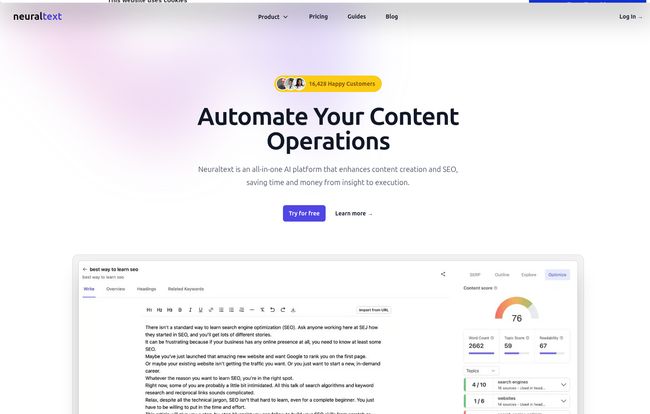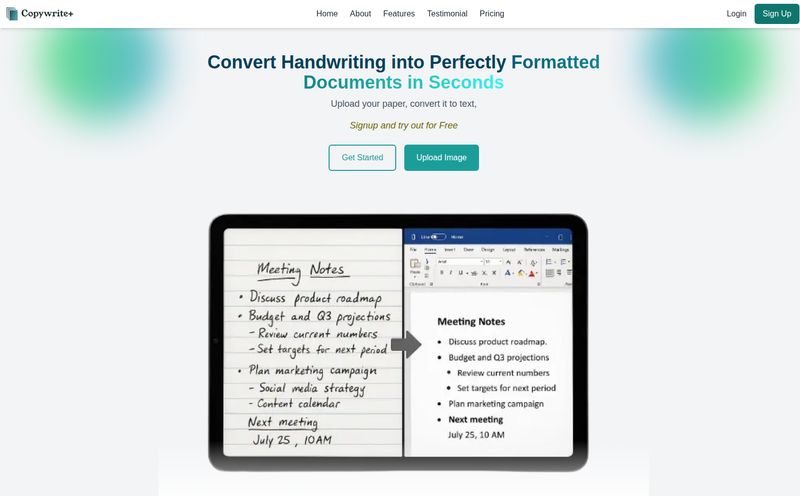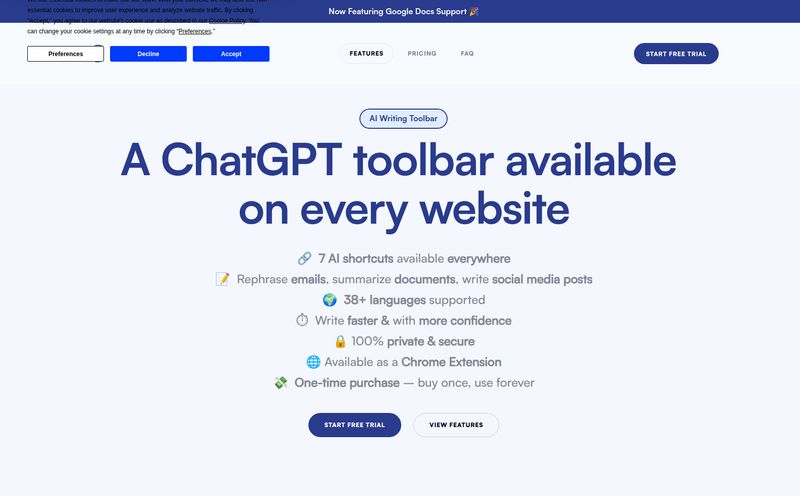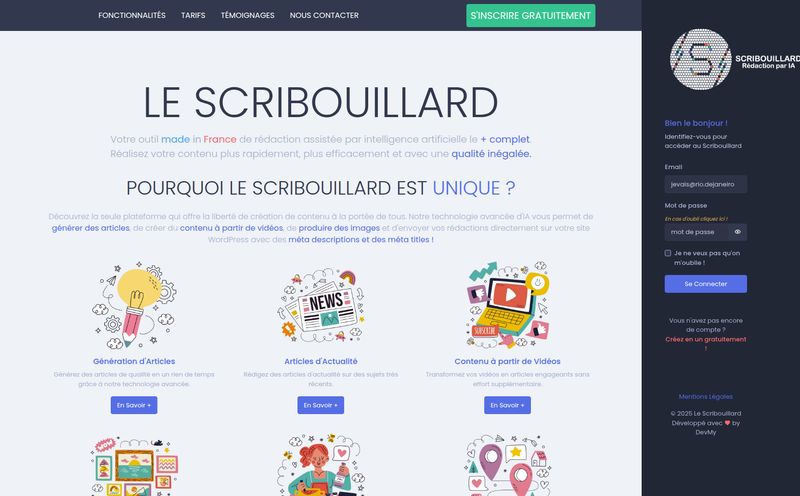The life of an SEO or a content manager can feel like you're perpetually on a high-speed treadmill. You're juggling keyword research, SERP analysis, content creation, performance tracking... and about a dozen different tools to do it all. One for keywords, another for outlines, a third for the actual writing, and a fourth to see if any of it is even working. It’s exhausting. And expensive.
So, whenever a platform pops up claiming to be an “all-in-one” solution, my inner skeptic raises a well-trained eyebrow. We've seen these claims before, right? But once in a while, a tool comes along that actually makes you pause. For me, recently, that tool has been NeuralText. It’s been making some noise, and I decided to kick the tires and see if it could really streamline the chaos of content marketing or if it was just another shiny object.
What Exactly is NeuralText Anyway?
At its core, NeuralText is an AI-powered platform designed to take you from the very first spark of an idea all the way to a published, optimized, and tracked piece of content. Think of it less as just an “AI writer” and more like a central command center for your content strategy. It aims to replace that messy folder of spreadsheets, documents, and subscriptions with a single, coherent workflow.
It’s built for people who are serious about getting results from their content—people like us. SEO professionals, content teams at companies like eBay and Forbes (who they list as users, which is some serious social proof), and solo creators who need to work smarter, not just harder.
A Look at the Core Features
This is where things get interesting. A tool is only as good as its features, and NeuralText packs a few that are genuinely impressive. Let’s break them down.
The AI Writing Assistant
Of course, there’s the AI writer. You can feed it a prompt and it will generate marketing copy, product descriptions, or entire blog post sections. The big question with any AI writer is always the same: does it sound human? In my experience, no AI is a perfect replacement for a human writer with real expertise. But that's not the point. I see tools like this as a co-pilot. It’s fantastic for smashing through writer's block, generating a first draft, or rephrasing a clunky paragraph. It gets the ball rolling, and you, the expert, provide the final polish, nuance, and personal stories. It’s about augmentation, not abdication.
Content Briefs: Your SEO Blueprint
Okay, this is my favorite part. Seriously. Before I write any important article, I spend at least an hour doing manual SERP analysis. I'm talking opening the top 10-20 results in a sea of tabs, meticulously copying H2s and H3s into a doc, looking for common questions in the “People Also Ask” box, and trying to reverse-engineer a winning structure. It's effective, but man, is it tedious.

Visit NeuralText
NeuralText’s Content Brief feature automates this entire process. You give it a target keyword, and it goes out and does all that dirty work for you. It analyzes the top-ranking content and comes back with a comprehensive brief that includes:
- Optimal Structure: Suggested headings (H1, H2, H3s) based on what's already ranking.
- Key Terms: Important keywords and topics to include for topical relevance.
- Questions to Answer: Pulls questions from SERP features like PAA and Quora.
- Competitor Analysis: A clean overview of what your competition is doing.
This feature alone is a huge time-saver and ensures you’re not just writing into the void but creating content that's structured to compete from day one.
Keyword Clustering: Making Sense of the Chaos
If you're trying to build topical authority (and you should be), you know how messy keyword lists can get. You export 5,000 keywords from a tool like Ahrefs and then face the soul-crushing task of manually grouping them into related sub-topics for your pillar and cluster pages. It can take days.
NeuralText has a Keyword Clustering tool that automates this. You dump your keyword list in, and it uses AI to group them based on search intent and semantic relevance. It’s like hiring a super-fast librarian to instantly organize your entire keyword library into perfectly neat sections. For building out a site's architecture or planning a new content hub, this is unbelievably powerful.
Content Analytics with GSC Integration
Closing the loop is critical. What's the point of creating all this amazing content if you don’t track its performance? NeuralText connects directly to your Google Search Console property. This allows you to see clicks, impressions, and average positions for your content right inside the same platform where you created it. It helps you identify content that's decaying, find low-hanging fruit for optimization, and prove the ROI of your efforts. A very smart addition.
Let's Talk Money: The NeuralText Pricing Plans
Alright, the all-important question: what's this going to cost me? The pricing structure is pretty straightforward, but there are a few things to notice. They do offer a 5-day trial, which is great for getting a feel for it.
| Plan | Price | Key Limits |
|---|---|---|
| Starter | $19 /month | 100k AI words, 5 Content Briefs, 2k keyword suggestions |
| Basic | $49 /month | 100k AI words, 40 Content Briefs, 20k keyword suggestions |
| Pro | $119 /month | 300k AI words, 100 Content Briefs, 50k keyword suggestions, 3 seats |
My take? The Starter plan is perfect for a solo blogger or someone managing a single, smaller site. The 5 content briefs per month is a bit tight but workable. The most interesting thing is that the Basic plan has the same 100,000 AI word limit as the Starter plan. You’re paying more for the significant jump in content briefs and keyword research capabilities. This makes the Basic plan ideal for a power user or a small business that relies heavily on data-driven content outlines.
The Pro plan is clearly for agencies or larger in-house content teams, with higher limits all around and multiple seats. The pricing feels fair for the value, especially when you consider the cost of subscribing to separate tools for each of these functions.
The Not-So-Perfect Parts
No tool is perfect, and it would be disingenuous to pretend otherwise. While I'm largely impressed, there are a few things to consider. The pricing, while fair, might be a stretch for those just starting out. The usage limits, especially on the lower tiers, mean you have to be strategic with how you use your credits for briefs and AI words.
And then there's the broader debate about AI and creativity. Some might argue that relying too heavily on these tools can lead to generic, soulless content. I get that. But I also believe a tool is only as good as the person using it. If you use NeuralText to blindly generate and publish content, then yeah, it probably won't be great. But if you use it to handle the grunt work so you can focus on strategy, unique insights, and storytelling... that’s a different story entirely.
So, Is NeuralText Worth It? My Final Verdict
After spending some quality time with it, my skeptical eyebrow has lowered. I'm genuinely impressed. For the right person, NeuralText isn't just another tool; it's a workflow transformation. It successfully combines some of the most time-consuming parts of SEO content creation into one clean, efficient platform.
Who should definitely try it?Content managers, SEO agencies, and serious bloggers who understand that data-driven content wins. If you value efficiency and want to scale your content production without sacrificing the strategic SEO work, you’ll probably love it.
Who might want to skip it?Hobby bloggers on a shoestring budget, or writers who truly enjoy the manual, painstaking process of research and outlining. If the process is as important to you as the result, this level of automation might not be for you.
For me, the ability to automate SERP analysis and keyword clustering is worth the price of admission alone. The rest is just a really nice bonus.
Frequently Asked Questions about NeuralText
- What makes NeuralText different from other AI writers like Jasper or Copy.ai?
- The biggest difference is the deep integration of SEO tools. While others focus primarily on AI text generation, NeuralText builds the entire SEO workflow around it, with standout features like Content Briefs based on SERP analysis and Keyword Clustering, making it a more complete solution for content marketers.
- Is the AI-generated content truly safe for SEO?
- Google's stance, as clarified by folks like Danny Sullivan, is that they reward good content, regardless of how it's produced. As long as you use AI as a tool to create high-quality, helpful, people-first content—and not to spam—you're fine. The key is to edit, fact-check, and add your own expertise.
- What’s the main difference between the Starter and Basic plans?
- This is a great question. Both have a 100,000 AI word limit. The big jump from Starter ($19) to Basic ($49) is in the other features: you go from 5 Content Briefs to 40, and from 2,000 keyword suggestions to 20,000. If you plan to create more than 5 thoroughly researched articles per month, the Basic plan is a necessary upgrade.
- Can I try NeuralText before buying?
- Yes, they offer a 5-day free trial that gives you a chance to test out the features and see if it fits your workflow before you commit to a paid plan.
- Is NeuralText a good choice for beginners in SEO?
- I'd say yes, with a caveat. It’s incredibly helpful because it automates best practices (like SERP analysis) that a beginner might not know how to do manually. However, it's still important to learn the 'why' behind these practices to get the most out of the tool.
Final Thoughts
Tools like NeuralText represent a fascinating shift in the content marketing world. They're not here to take our jobs; they're here to take our most tedious tasks. By handling the heavy lifting of data analysis and initial drafting, they free us up to be more strategic, more creative, and ultimately, more effective. If you're looking to get off the content treadmill and start working smarter, I think NeuralText is definately worth a look.



